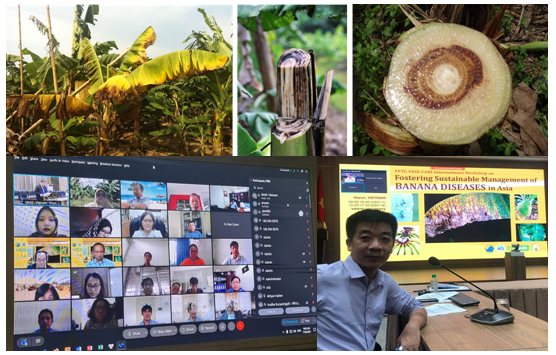Control Fusarium oxysporum f.sp. cubensis causing disease on banana by using antagonistic organism – A potential approach
Cập nhật lúc 11:15, Thứ sáu, 27/08/2021 (GMT+7)
Panama wilt is a common disease of banana plants, caused by a fungal disease called Fusarium oxysporum f.sp. cubense (Foc). The disease caused by Fusarium on banana plants is described as a "classical" vascular wilt disease. The pathogen enters the vascular tissue (xylem) through the roots causing discoloration and wilting. As the disease progresses, many leaves turn yellow, then the plant dies.
Panama wilt is a common disease of banana plants, caused by a fungal disease called Fusarium oxysporum f.sp. cubense (Foc). The disease caused by Fusarium on banana plants is described as a "classical" vascular wilt disease. The pathogen enters the vascular tissue (xylem) through the roots causing discoloration and wilting. As the disease progresses, many leaves turn yellow, then the plant dies. When the disease occurs in the field, it cannot be controlled by current conventional measures. Foc is a difficult fungus to control for several reasons such as (a) long-lived in soil (up to 20 years even without a host plant; (b) it is a disease that attacks the vascular system; (c) it can spread through vegetative reproduction of banana trees, soil contaminated with fungi, irrigation water...; (d) banana-growing areas are usually specialized cultivation areas, so it is easy for fungi spreading through crops. Panama disease is a major concern for the banana industry. In particular, the emergence and spread of the TR4 strain strongly affect the production, income, and employment in many tropical countries. Currently, to control the disease caused by Foc on bananas, many different methods have been studied and applied such as using chemicals, selecting resistant varieties, and using antagonistic organisms to inhibit the growth of Fox. Up to date, using chemicals often fails to achieve the desired and lasting results in the field as well as is harmful to the environment. Besides that, so far there is no commercial banana variety that has effective resistance to TR4 strain. Therefore, many research projects, as well as international forums, have taken place aiming to save bananas from the destruction of this fungus. Using antagonistic organisms for disease management is a sustainable application and suitable for many ecological regions. Having the same interest as many domestic and international researchers, the excellent research team of the Faculty of Biotechnology has carried out studies for applying antagonistic microorganisms in preventing the growth of Foc. Currently, the research team is in charge of a state-level project: "Exploiting actinomycetes (Streptomyces sp. VNUA24, VNUA74, and VNUA116) genetic resources to produce preparation for control Panama disease". During the research process, the group always exchanges and updates information with other laboratories in the world. In July 2021, the research team participated in the international conference (webinar) "Fostering sustainable management of banana diseases in Asia". At the conference, the group's research results were discussed and evaluated as a potential direction of application on a field scale to control Foc. The research team also believes that this is a good achievement, contributing to sustainable banana production in Vietnam.
    |
 |
| Some pictures at the conference "Fostering sustainable management of banana diseases in Asia (July 22, 2021) |